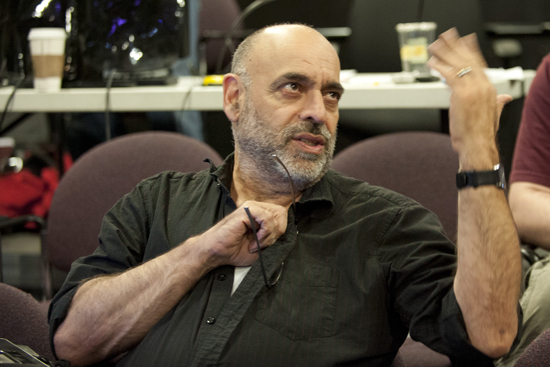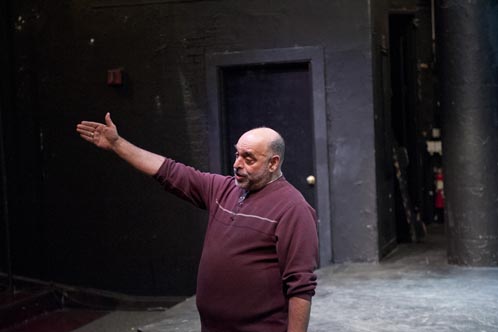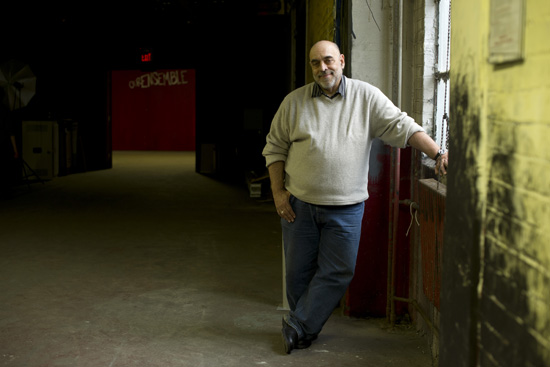“The King of All Things Are Possible”
Under Petosa, a conservatory that’s also a theater company

Jim Petosa, head of CFA’s School of Theatre and artistic director of New Repertory in Watertown, describes his dual roles as synergistic. He’s directing New Rep’s current production of Stephen Sondheim’s Assassins, with a cast and crew peppered with BU alumni. Photo by Kalman Zabarsky
New Repertory Theatre’s October, 2014 run of Stephen Sondheim’s ghoulish musical Assassins marked a kind of poetic symmetry for its director, Jim Petosa. Head of the College of Fine Arts School of Theatre since 2002, Petosa became artistic director of the Watertown, Mass., New Rep in 2012, and has used his dual appointments not only to educate a new generation of actors, directors, and designers, but also to shepherd BU students into the professional theater world by toppling the traditional firewall between the conservatory and the creative universe beyond. And this production had BU written all over it.
“There was a pedagogical notion—and not just at BU—that conservatories are a place of sequestration, almost like a theological seminary,” says Petosa, who came to CFA at a time when, his colleagues say, the theater department lacked focus. “I find that to be a quaint notion, or worse yet, an unduly empowering construct for the conservatory, in that the conservatory knows all. But theater training is more about advanced apprenticeships—the young actor learns at the hands of the seasoned actor.”
Under Petosa’s watch, CFA—with its wealth of onstage, offstage, and backstage talent—has forged a partnership with New Rep similar to the one it shares with the Huntington Theatre Company, a partnership that started at its founding by BU in 1982 and continued to thrive after the Huntington was separately incorporated in 1986. Like New Rep’s critically acclaimed 2012 staging of Matthew Spangler’s adaptation of the Khaled Hosseini novel Kite Runner, Assassins was populated by some of CFA’s most gifted talents—its murderous ensemble cast featured five graduates and two faculty, and a design team consisting of three alumni. The show’s music director, Matt Stern (CFA’15), is working toward an MFA in theater education and its choreographer, Judith Chaffee, is a CFA associate professor of movement in the School of Theatre. Some cast members reprised roles from the May 2012 CFA production, which Petosa directed at the BU Theatre. This makes Petosa, an unrelenting multitasker (he’s directed close to 100 productions at BU since 2002), brim not just with pride, but with confidence that young people who choose this difficult career will find rewarding outlets for their craft.

The cast of Sondheim’s dark musical Assassins, which runs through October 26 at New Rep in Watertown. Photo by Rob Lorino
In Assassins, killers and attempted killers of presidents sing and cavort in a malevolent parody of a carnival game. They are a mostly nefarious band of characters that includes John Wilkes Booth; Lee Harvey Oswald; the lesser-known Leon Czolgosz, who killed President William McKinley; and Samuel Byck, who tried to polish off President Richard Nixon. The Boston Globe raved about the New Rep production, praising Petosa for his “perceptive direction.” An enthusiast of Sondheim and musicals in general, Petosa also frequently stage directs CFA operas, including last fall’s Fringe Festival production of Le Tragédie de Carmen.
An exuberant, gentle bear of a man whose stentorian voice will never require amplification, Petosa is a walking rebuke to the notion that phrases like “acting career” and “directing career” are increasingly oxymoronic. But if students are to be launched with a shot at success, his program must be run like a theater company, with collaboration as its driving force, says Petosa. His model for the school is “the artistic home,” a label typically applied to American regional theaters, he says. His own vitality and belief in theater—what he likes to call “the most liberal of the liberal arts”—inspires everyone around him.
“My students are empowered to be adventurous and to be curious,” says Petosa. “We give them the tools to be self-evaluative, so that they are firmly in the driver’s seat of their own art. I want us to be models for them, I want them to look at us, the faculty, as what they want to be—curious, disciplined, skilled, but always looking to improve themselves, to give up egocentric notions.”
“I feel like Jim always has the right words to get his students to go further,” says Emily Ranii (CFA’13), who earned a master’s degree in directing. “All of us have different interests, strengths, and weaknesses, and he spends a lot of time watching and listening, and then seeing what each individual needs.”

At 60, Petosa is a force of nature, and his efforts are spread so generously it’s hard to believe he has a life outside of all this. But he’s just a regular guy, says colleague Elaine Vaan Hogue (CFA’97). “He has a partner, and a cat, and a house in Quincy.” In a Boston Globe story about Petosa’s NRT hiring, New Rep’s managing director acknowledged that his holding two positions was a concern to the company’s 19-member board, which ultimately voted unanimously in Petosa’s favor. But when the managing director spoke with those who have worked with Petosa, she told the Globe, “Everybody said that if anybody can do it, Jim can do it.” He’s a “master manager of time,” says Vaan Hogue.
How does he do it? “I think of it as wearing one hat rather than two,” says Petosa of his dual directorships. “It’s not so much a division as a synergy. Because New Rep is a member of our professional initiative, what I’m doing has a very positive impact on the school.” As an artistic home, the School of Theatre is a noisy, lively one, with about 300 students—260 undergrads and 50 graduate students. Production and design majors go on to specialize in production, design, or management. Theater students begin with performance core coursework and then break out to majors like theater arts or acting. The graduate students are divided among specialties, but at some point, their creative paths cross and overlap. “Theater, the art form, is collaborative by its essence,” says Petosa. “We are not a school that advocates for extreme egocentricity on the part of any artist. Our students go into the world with that value firmly in place.”
Petosa’s students and protégés call him “Mr. Eloquent,” and after just a few minutes in his company anyone would understand why. Lacking any shred of pretense, he is both fiercely demanding and reassuringly paternal. In the face of grueling rehearsal schedules, he never seems fatigued or off his game. His drama criticism class or “drama crit,” a required two-semester course, instills in students not just theater literacy and context, but a hunger for context. On a recent fall morning, the class was discussing lenses—moral, psychological, and sociological. Petosa communicates in sentences that are either bitingly succinct or loop, detour, and somehow find their way back to clean resolution. He is a fount of quotable morsels such as, “I like to think of the psychology of the author as a side dish, not the entrée.” In the course of just minutes, he alights on references to Shakespeare, Arthur Miller, Harold Pinter, Frederico García Lorca, Athol Fugard, Joseph Campbell, and Caryl Churchill. “He is one of the most well-read people I’ve ever known,” says Paula Langton, CFA associate professor and head of acting.
Petosa’s abiding philosophy at CFA is that actors and directors who teach also need to act and direct. They need to be out in the world, and that benefits students, whether it’s at the BU satellites like the Huntington or New Rep, or theaters as far-flung as Wellfleet, Mass., on Cape Cod. “He makes it clear that he wants us to work,” says Vaan Hogue, a CFA assistant professor and the the School of Theatre’s program director of theater arts, who is currently directing Complicite’s A Disappearing Number at the Underground Railway Theatre in Cambridge. “He’s the king of all things are possible.” Colleagues praise him for putting an emphasis on teaching while maintaining active careers in the theater. “It’s unusual for an artist to not feel trapped in academia,” says Langton, who appeared in the New Rep production of Assassins.



Clockwise from top left: Petosa directs the CFA production of A Question of Mercy in 2006; Petosa in his element in 2013, welcoming a School of Theatre Showcase audience; Petosa chats with Bluebeard music director William Lumpkin, left, and CFA board member and executive stage director at the Metropolitan Opera David Knuess (center). Photos by Kalman Zabarsky
Petosa doesn’t play favorites, and he never loses it, says Langton. “I’ve seen him in the eleventh hour, and never heard him raise his voice,” she says. (Petosa says on the rare occasions he gets angry, he becomes “very, very quiet.”) Langton was part of Petosa’s hiring committee and recalls being struck by how he really listened. The department was suffering from an identity crisis and Petosa “started a real conversation,” she recalls.
The son of an administrator for the US Defense Department who was drawn to theater as a child attending an all-boys school in New Jersey, Petosa acted in school plays. The possibilities captivated him. “I knew I wanted to study theater, and I never looked back,” says Petosa, who went on to major in theater at the Catholic University in Washington.
Petosa has served on the faculty of the Catholic University as well as of the University of Maryland–College Park and the Heifetz International Music Institute at St. John’s College. He has been a visiting professor at Middlebury College and an artist-in-residence at George Washington University; has had stints as director for the New York Theatre Studio and Theatre Matrix; and was performing arts coordinator for the Cathedral of St. John the Divine in Manhattan. At Maryland’s Olney Theatre Center for the Arts, where he was artistic director from 1994 to 2012, Petosa grew the Olney from a summer theater to a company that produced year-round programming, transforming it into an expanded, thriving center. Petosa won numerous local, regional, and national awards, including a Helen Hayes Award for directing a production of Jacques Brel Is Alive and Well. Other directing credits at the Olney include The Glass Menagerie, Democracy, Copenhagen, The Laramie Project, and Art, Look! We Have Come Through!
At BU, Petosa, who established the prolific and multiple-awards-winning Boston Center for American Performance, (BCAP) has directed numerous productions, including Merrily We Roll Along, Trumpery, Stuff Happens, Red Noses, Scenes from an Execution, and Amadeus, as well as the Opera Institute productions of Postcard from Morocco, Bluebeard’s Castle, Antigone, Carmen, and A Midsummer Night’s Dream.

Though his favorite play is, he says, “the one I’m working on at the moment,” he’s enamored of the work of American playwright Neal Bell. “His taut, muscular dramas are made with characters living on the brink and language that is both spare and poetic, and an understanding of action that makes him a director’s dream,” says Petosa, who has directed five of Bell’s works, including BCAP’s production of Monster, Bell’s adaptation of Mary Shelley’s Frankenstein.
Having strutted and fretted for so long in the shadow of New York City, Greater Boston is emerging as a magnet for theater talent, and Petosa has earned his colleagues’ respect for his part in the trend. American Repertory Theatre artistic director Diane Paulus credits Petosa with helping “to stimulate the creative ecology of the region. He is literally cultivating the next generation of theater makers as director of the School of Theatre at BU, and those students, in turn, are creating work and adding to the breadth and depth of theater being made in Boston and up and down the East Coast. And now, as the artistic head of New Rep, he is further stretching this city’s great artistic aspirations and reputation.”
“I think Jim’s greatest contribution to BU is his willingness to encourage experimentation within the conservatory style,” says John Zdrojeski (CFA’12). “The idea that the most important people to your life as an artist do not have to be ‘the establishment,’ and instead can (and should) be the people you go to school with, is unique to BU. In some ways,” says Zdrojeski, “it’s a paradox working with Jim, because the man is so smart, you’re half-praying the entire time that something will come up that will cause him to go into a manifesto on what the playwright or ensemble is trying to capture in this moment, or, alternatively, some hilarious story.” But “if a scene is really cooking, he starts rejoicing in the work in a way no other director I’ve ever worked with does.”
Petosa has raised the BU conservatory’s national visibility as well. Last year, Backstage magazine named BU one of the “5 Tried-and-True Acting Colleges,” applauding the School of Theatre for pushing actors “to be part of a play as well as understand the role their play takes on in the larger discussion.” The magazine praised Petosa for his insistence that the actors in his program “weigh in the gravitas of their performances, understand the intellectual rigor they present in their characters, and work to contextualize themselves within the human condition, both through individual and collaborative ensemble work.” It’s a foundation that fosters in graduates a lifelong connection to CFA. “I get messages from alumni asking questions about projects or areas of research, and there isn’t a day that goes by that I don’t get some message from someone who studied here who’s just checking in,” Petosa says. “It proves that they do think of BU School of Theatre as a place they never really leave.”
Friend and mentor to so many, Petosa is “always looking for ways for us to shine,” says Vaan Hogue. “Can you tell that we love him?”
A version of this story was published on October 16, 2014.
Comments & Discussion
Boston University moderates comments to facilitate an informed, substantive, civil conversation. Abusive, profane, self-promotional, misleading, incoherent or off-topic comments will be rejected. Moderators are staffed during regular business hours (EST) and can only accept comments written in English. Statistics or facts must include a citation or a link to the citation.